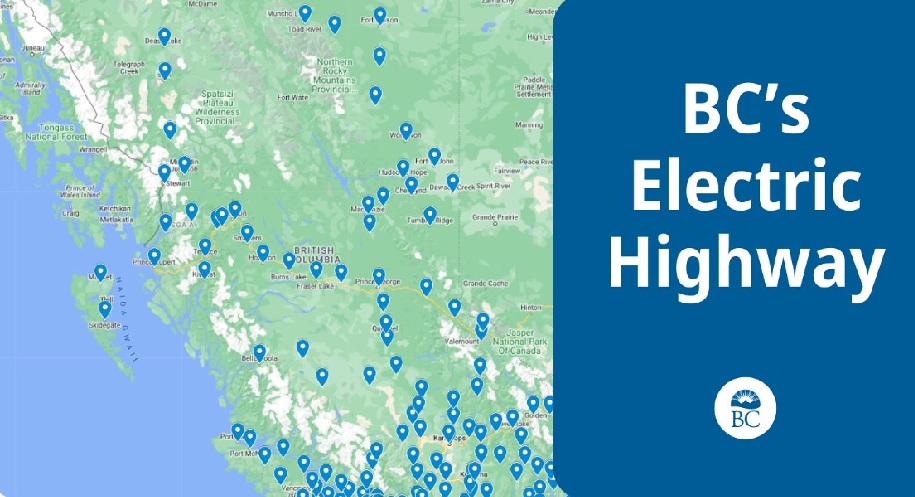British Columbians will soon be able to drive throughout the entire province in an electric vehicle (EV) making clean-energy options more accessible and reliable than ever.
The Province is completing B.C.’s “Electric Highway,” a comprehensive network of public EV fast-charging stations along all highways and major roadways located approximately 150 kilometres apart.
Spanning the entirety of the province, B.C.’s Electric Highway will open up EV travel from Alaska all through British Columbia and along the west coast down to California.
All B.C. sites will be energized, in service and open to the public before the end of September.
“We are building out the infrastructure we need to power B.C.’s future with clean, affordable electricity. The completion of B.C.’s Electric Highway is a historic milestone in connecting our province and making clean energy more accessible and reliable,” says Josie Osborne, Minister of Energy, Mines and Low Carbon Innovation.
B.C.’s Electric Highway network includes 155 charging sites and more than 310 fast chargers, with some sites offering additional Level 2 chargers.
The network’s broad geographic coverage ensures that EV drivers can confidently travel anywhere in B.C., knowing they are never far from a fast-charging station.
This helps address “range anxiety” – a concern of potential EV drivers – by guaranteeing that no part of the province is out of reach for EVs.
The completion of B.C.’s Electric Highway by summer 2024 fulfils a key commitment of CleanBC, the Province’s climate action plan.
In addition, the Province is working toward an overall target of building 10,000 public charging stations by 2030.
As of August 2024, there are more than 5,300 public charging stations in the province, an increase of nearly 350% since 2018.
“By investing in public charging infrastructure and completing B.C.’s Electric Highway, clean travel options will be more accessible for people and businesses as we continue our work to build a sustainable future for all British Columbians,” indicates George Heyman, Minister of Environment and Climate Change Strategy.
Completing B.C.’s Electric Highway was a collaborative effort involving utilities, local governments, Indigenous communities, the Ministry of Transportation and Infrastructure, and the private sector.
The Province has contributed more than $13 million directly to this initiative through the GoElectric Public Charger Program and additional funding through Natural Resources Canada’s Zero-Emission Vehicle Infrastructure Program.
In addition to the completion of the Electric Highway, the Province also announced Sept. 6, 2024, a $14-million boost to the GoElectric Home and Workplace Charger Program.
This funding will support individuals and businesses to install EV chargers at their homes and workplaces, further expanding the accessibility and convenience of electric vehicles in B.C. and making the shift to electric transportation even more seamless.
This initiative, managed by BC Hydro and FortisBC (for their electric utility in the southern Interior), is already accepting applications and is a crucial component of the Province’s broader strategy to make electric vehicle ownership a practical and attractive option for all British Columbians.
In another first for British Columbia, BC Hydro will start rolling out 400 kilowatts charging stations, capable of providing up to 100 kilometres of charge in just two to three minutes, early next year.
While no locations have been confirmed, the plan is to place these chargers close to major highways where drivers have the greatest need for charging quickly.
Chris O’Riley, president and CEO at BC Hydro, says: “British Columbians are embracing electric vehicles faster than any other jurisdiction in Canada and that’s why we are continuing to make investments for growth within our current system and building out our fast-charging network across B.C.”
Dawn Mehrer, vice-president of corporate services and technology at FortisBC, indicates: “As part of our efforts to support customers who are making low- and zero-carbon energy choices for transportation, FortisBC is continuing to work with government and stakeholders as we operate a network of fast-charging stations in the southern Interior region, and ensure EV drivers can travel with confidence across B.C.”
Chief Marie Quock, Iskut Band Development Corp., states: “Our community of Iskut is proud to be a key hub in this network, promoting clean energy and environmental stewardship for future generations.”
Mark Starlund, general manager at Meziadin Junction Limited Partnership, says: “We are very proud to share that our hard work over the last two years came to fruition with the commission and completion of the Meziadin Junction EV charging station, the very first DCFC fast charger on Highway 37, located on the Meziadin Wilp Wii Litsxw Indigenous protected area.”
“The best part about this project is that the Gitanyow Hereditary Chiefs retain 100% ownership of the charging station and the carbon credits it generates. This project serves as a case study for First Nations to capitalize on their own EV charging sites,” he adds.
Read more: Global eMobility transition “politically divided”: What are the causes and consequences?






